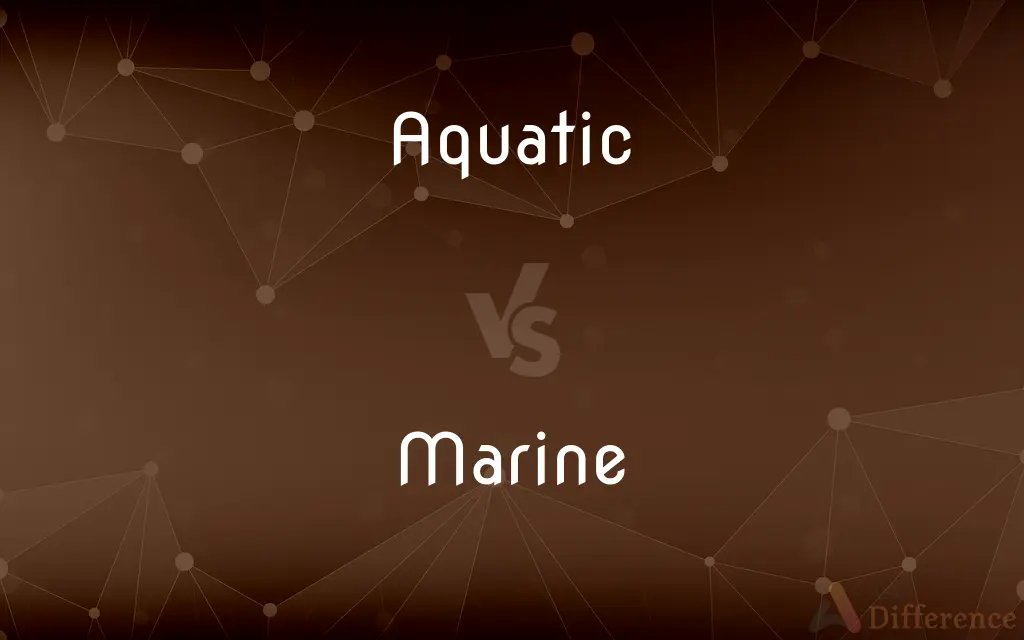Aquatic vs. Marine — What's the Difference?
By Tayyaba Rehman & Fiza Rafique — Updated on March 20, 2024
Aquatic relates to water environments in general, while marine specifically refers to the sea or ocean.

Difference Between Aquatic and Marine
Table of Contents
ADVERTISEMENT
Key Differences
Aquatic encompasses all water-based habitats, including freshwater and marine environments, covering a wide range of ecosystems such as lakes, rivers, ponds, wetlands, and oceans, whereas marine environments are exclusively associated with saltwater habitats like seas and oceans.
While aquatic organisms can be found in both freshwater and saltwater, including fish, plants, and microorganisms adapted to various water conditions, marine life is specifically adapted to the saltwater conditions of the oceanic environment, including a diverse range of species from microscopic plankton to large whales.
Aquatic sciences study both freshwater and marine systems, examining aspects like hydrology, ecology, and biodiversity, while marine sciences focus on understanding the ocean's biological, chemical, physical, and geological aspects.
Conservation efforts in aquatic environments address challenges across freshwater and marine ecosystems, including pollution, habitat destruction, and climate change impacts, whereas marine conservation specifically targets the preservation of oceanic ecosystems and species, addressing issues like overfishing, coral reef degradation, and ocean pollution.
Comparison Chart
Definition
Relating to water environments in general
Specifically relating to the sea or ocean
ADVERTISEMENT
Environments
Includes freshwater and marine habitats
Limited to saltwater habitats like seas and oceans
Organisms
Encompasses organisms in freshwater and saltwater
Includes organisms adapted to saltwater conditions
Sciences
Studies both freshwater and marine ecosystems
Focuses on the ocean's biological, chemical, physical, and geological aspects
Conservation
Addresses challenges in freshwater and marine ecosystems
Targets the preservation of oceanic ecosystems and species
Compare with Definitions
Aquatic
Pertaining to all water-based environments.
Aquatic ecosystems include diverse habitats like rivers and coral reefs.
Marine
Concerned with the ocean and its ecosystems.
Marine biology focuses on life forms found in saltwater environments.
Aquatic
Conservation efforts span diverse ecosystems.
Aquatic conservation addresses pollution in lakes as well as oceans.
Marine
Life is adapted to saltwater conditions.
Marine organisms, such as corals and fish, thrive in saline waters.
Aquatic
Studied in various scientific disciplines.
Aquatic biology examines life in both freshwater and marine settings.
Marine
Explored in marine sciences like oceanography.
Marine geology studies the ocean floor's structure and processes.
Aquatic
Supports a wide range of life forms.
Aquatic plants and animals vary from freshwater species to deep-sea creatures.
Marine
Habitats include deep-sea trenches and coastal waters.
Marine habitats are critical for biodiversity and climate regulation.
Aquatic
Environments range from stagnant ponds to flowing streams.
The biodiversity of aquatic environments supports numerous ecosystems.
Marine
Conservation focuses on oceanic issues.
Marine conservation efforts combat overfishing and protect coral reefs.
Aquatic
Consisting of, relating to, or being in water
An aquatic environment.
Marine
Relating to or found in the sea
Marine plants
Marine biology
Aquatic
Living solely or chiefly in or on the water
Aquatic animals and plants.
Marine
A member of a body of troops trained to serve on land or sea, in particular (in the UK) a member of the Royal Marines or (in the US) a member of the Marine Corps
A contingent of 2,000 marines
Aquatic
Taking place in or on the water
An aquatic sport.
Marine
Of or relating to the sea
Marine exploration.
Aquatic
An organism that lives solely or chiefly in or on the water.
Marine
Native to, inhabiting, or formed by the sea
Marine animals.
Aquatic
Aquatics(Sports) Athletic activities performed in or on the water.
Marine
Relating to a system of oceanic habitats coextensive with the continental shelf, ranging from deep water to unprotected coastlines and characterized along its landward edge by exposure to wave action and tidal currents and by the absence of trees, shrubs, or emergent vegetation.
Aquatic
Relating to water; living in or near water, taking place in water.
Marine
Of or relating to shipping or maritime affairs.
Aquatic
Any aquatic plant.
Marine
Of or relating to sea navigation; nautical
A marine chart.
Aquatic
Pertaining to water; growing in water; living in, swimming in, or frequenting the margins of waters; as, aquatic plants and fowls.
Marine
Of or relating to troops that serve at sea as well as on land, specifically the US Marine Corps.
Aquatic
An aquatic animal or plant.
Marine
A soldier serving on a ship or at a naval installation.
Aquatic
Sports or exercises practiced in or on the water.
Marine
Often Marine A member of the US Marine Corps.
Aquatic
A plant that lives in or on water
Marine
The mercantile or naval ships or shipping fleet of a country.
Aquatic
Relating to or consisting of or being in water;
An aquatic environment
Marine
The governmental department in charge of naval affairs in some nations.
Aquatic
Operating or living or growing in water;
Boats are aquatic vehicles
Water lilies are aquatic plants
Fish are aquatic animals
Marine
A painting or photograph of the sea.
Marine
Belonging to or characteristic of the sea; existing or found in the sea; formed or produced by the sea.
Marine
Relating to or connected with the sea (in operation, scope, etc.), especially as pertains to shipping, a navy, or naval forces.
Marine
Used or adapted for use at sea.
Marine
(zoology) Inhabiting the high seas; oceanic; pelagic. maritime or littoral}}
Marine
(obsolete) Belonging to or situated at the seaside; maritime.
Marine
A soldier, normally a member of a marine corps, trained to serve on board or from a ship
He was a marine in World War II.
Marine
A marine corps.
He fought with the Marines in World War II.
Marine
A painting representing some marine subject.
Marine
To adapt for use in a marine environment.
Marine
To temporarily inundate with water and/or other marine substances.
Marine
To equip (a boat) with sailors and other personnel required for an ocean voyage.
Marine
Of or pertaining to the sea; having to do with the ocean, or with navigation or naval affairs; nautical; as, marine productions or bodies; marine shells; a marine engine.
Marine
Formed by the action of the currents or waves of the sea; as, marine deposits.
Marine
A solider serving on shipboard; a sea soldier; one of a body of troops trained to do duty in the navy.
Marine
A member of the United States Marine Corps, or a similar foreign military force.
Marine
The sum of naval affairs; naval economy; the department of navigation and sea forces; the collective shipping of a country; as, the mercantile marine.
Marine
A picture representing some marine subject.
Marine
A member of the United States Marine Corps
Marine
Of or relating to the sea;
Marine explorations
Marine
Relating to or involving ships or shipping or navigation or seamen;
Nautical charts
Maritime law
Marine insurance
Marine
Of or relating to military personnel who serve both on land and at sea (specifically the U.S. Marine Corps);
Marine barracks
Marine
Native to or inhabiting the sea;
Marine plants and animals such as seaweed and whales
Common Curiosities
What defines an aquatic environment?
An aquatic environment is any habitat that involves water, whether it's freshwater like rivers and lakes or saltwater like seas and oceans.
How do the conservation needs of aquatic and marine environments differ?
Conservation in aquatic environments addresses issues in both freshwater and marine systems, while marine conservation focuses specifically on ocean-related challenges such as coral reef protection and sustainable fishing practices.
Why is marine life biodiversity important?
Marine biodiversity is crucial for maintaining the ocean's ecological balance, supporting the food chain, providing valuable resources for humans, and regulating the global climate.
What is the significance of studying aquatic sciences?
Studying aquatic sciences helps us understand the complex interactions within water-based ecosystems, their impact on global biodiversity, climate regulation, and how to manage and conserve these vital resources effectively.
How does climate change affect aquatic and marine environments?
Climate change impacts aquatic and marine environments through rising temperatures, altered precipitation patterns affecting freshwater habitats, sea-level rise, ocean acidification, and changes in ocean currents, affecting biodiversity and ecosystem services.
What makes an environment marine?
A marine environment specifically refers to saltwater habitats found in seas and oceans, characterized by their saline water conditions.
Are wetlands considered aquatic or marine?
Wetlands are considered aquatic environments because they are water-saturated areas, but they can be freshwater, brackish, or saltwater, making some of them marine as well.
Can a species be both aquatic and marine?
While all marine species are aquatic, not all aquatic species are marine. Aquatic encompasses both freshwater and marine species, but marine species are specifically adapted to the ocean.
How do aquatic plants differ from marine plants?
Aquatic plants can be found in both freshwater and marine environments and are adapted to their specific water conditions, while marine plants are specifically adapted to the saline conditions of the ocean.
What challenges do marine ecosystems face?
Marine ecosystems face challenges such as overfishing, pollution, habitat destruction, acidification, and the impacts of climate change, threatening their health and biodiversity.
Share Your Discovery

Previous Comparison
Muslims vs. Arabs
Next Comparison
Stream vs. ChannelAuthor Spotlight
Written by
Tayyaba RehmanTayyaba Rehman is a distinguished writer, currently serving as a primary contributor to askdifference.com. As a researcher in semantics and etymology, Tayyaba's passion for the complexity of languages and their distinctions has found a perfect home on the platform. Tayyaba delves into the intricacies of language, distinguishing between commonly confused words and phrases, thereby providing clarity for readers worldwide.
Co-written by
Fiza RafiqueFiza Rafique is a skilled content writer at AskDifference.com, where she meticulously refines and enhances written pieces. Drawing from her vast editorial expertise, Fiza ensures clarity, accuracy, and precision in every article. Passionate about language, she continually seeks to elevate the quality of content for readers worldwide.














































